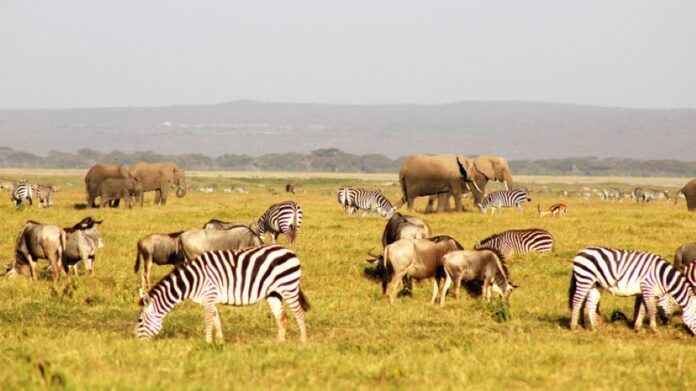A recent study by Lacan, L. (2024) titled “Killing tsetse and/or saving wildlife? A multispecies assemblage in colonial Zambia (1895–1959)” published in the Journal of Anthropology Southern Africa by Taylor & Francis shows that the tsetse control efforts in colonial Zambia were deeply intertwined with wildlife management.
“
Colonial Zambia’s tsetse control efforts were deeply intertwined with wildlife management, shaping lasting ecological impacts.– Lacan, L. 2024
The article examines the historical efforts to control the tsetse fly in colonial Zambia (1895–1959), providing a nuanced exploration of how these measures were deeply intertwined with the broader colonial project of reshaping the natural and social landscape. Tsetse control efforts were driven by the threat posed by the fly, a vector for trypanosomiasis (sleeping sickness) in both humans and livestock, which significantly hindered colonial agricultural and economic goals. Central to these efforts was the management of wildlife, which was viewed through a dual lens: as both a threat and a resource. On the one hand, wild animals were seen as reservoirs for the tsetse fly, perpetuating the disease cycle, leading to widespread campaigns of game elimination. On the other hand, wildlife was valued as a source of revenue through hunting and tourism, complicating the narrative around its eradication.
To control tsetse populations, colonial authorities employed aggressive and often disruptive methods, including the mass culling of wildlife, clearing large tracts of vegetation to destroy the fly’s habitat, and forcibly resettling human populations to create “fly-free zones.” These interventions reflected the colonial vision of separating “civilized” human spaces from the untamed wilderness, reinforcing a dichotomy between humans and nature. This separation was not only physical but ideological, shaping policies that prioritized agricultural and economic development at the expense of ecological balance and local livelihoods. The article also explores the long-term consequences of these colonial policies on Zambia’s wildlife management and conservation efforts. Many of the practices and attitudes established during this period, such as the demarcation of conservation areas and the displacement of local communities, continue to influence contemporary conservation strategies. These legacies highlight the enduring tensions between conservation goals, economic development, and the rights of indigenous populations, offering critical insights into the intersection of environmental and colonial histories.
How the Study was Conducted
The study employed a combination of archival research and analysis of historical records. The author examined various methods used for tsetse control, such as game elimination, vegetation clearing, and resettlement of populations, and also analyzed the impact of these methods on wildlife management and conservation areas. The study involved reviewing documents, reports, and correspondence from the colonial period to understand the strategies and policies implemented for tsetse control and their long-term effects on the environment and local communities
What the Authors Found
The authors found that the tsetse control efforts in colonial Zambia were deeply intertwined with wildlife management. The author also discovered that wildlife was viewed both as a threat to be eliminated and as a resource to be conserved.
Why is this important?
This study is important because it sheds light on the historical practices of tsetse control and wildlife management in colonial Zambia, revealing how these efforts were deeply intertwined. The findings highlight the lasting impact of colonial policies on current wildlife management and conservation areas. Understanding this history helps us appreciate the complexities of managing human-wildlife interactions and the long-term consequences of past interventions on the environment and local communities. It also underscores the need for sustainable and ethical approaches to wildlife conservation and disease control in the present day.
What the Authors Recommended
- The authors recommend a more integrated and holistic approach to tsetse control and wildlife management.
- The study suggests that future efforts should consider the complex multispecies relationships and the historical context of past interventions.
- The authors emphasize the importance of balancing tsetse control with wildlife conservation, ensuring that both human and ecological needs are met.
- In addition, the study also highlight the need for sustainable and ethical practices that take into account the long-term impacts on local communities and the environment
In conclusion, the study by Lacan (2024) highlights the intricate connections between tsetse control, wildlife management, and colonial policies in Zambia, revealing the profound and lasting effects of these historical interventions on the environment and local communities. By examining the past, the research underscores the need for sustainable, ethical, and inclusive approaches to conservation and disease control that acknowledge the complex relationships between humans, wildlife, and ecosystems. These insights serve as a critical reminder of the importance of integrating historical lessons into present-day strategies for managing ecological and social challenges.
















 The African Research (AR) Index is a comprehensive scholarly directory and database focused explicitly on journal publishers that publish and disseminate African research.
The African Research (AR) Index is a comprehensive scholarly directory and database focused explicitly on journal publishers that publish and disseminate African research.

